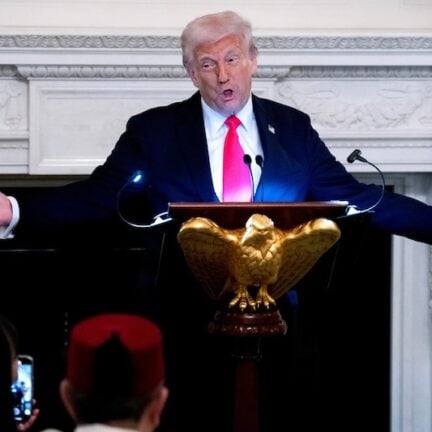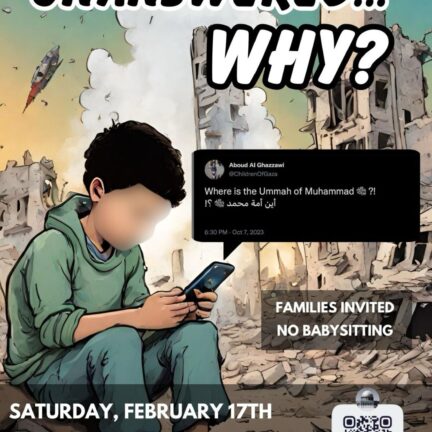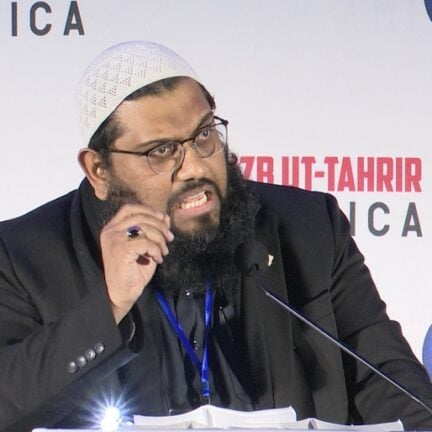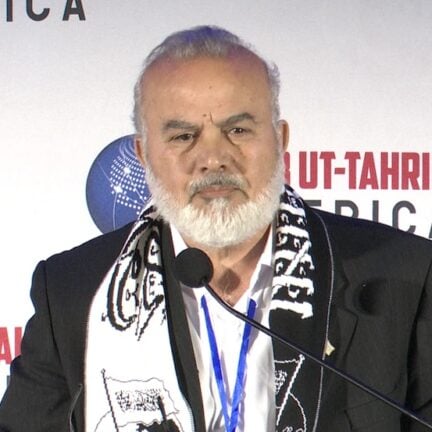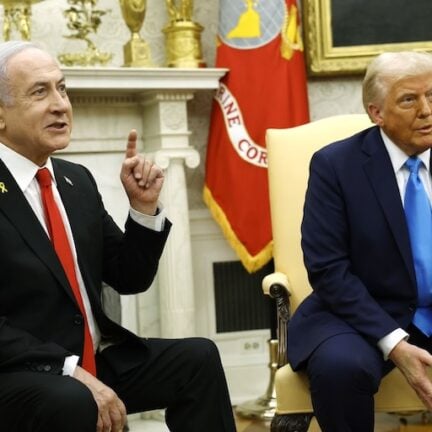Question:
Assalam Alaikum Wa Rahmatullah Wa Barakatuh our honourable Sheikh and Ameer. I ask Allah for your good health and wellness.
My question is: Does our master Isa, peace be upon him, have a people (qawm), even though he has no father as stated in the book “A Refutation of Western Capitalist Thought”, page 138?
May Allah reward you with all the best and support you with his victory.
Anis Tardaeh, Palestine.
Answer:
Wa Alaikum Assalam Wa Rahmatullah Wa Barakatuh
The place you are asking about is what he said in the book, A Refutation of Western Capitalist Thought, page 138: (And the Creator (swt) specified how to link the relationship with the creature, so He sent messengers to mankind, including Musa, peace be upon him, to his people, Isa, peace be upon him, to his people, and Muhammad, peace be upon him, to all people.) End
And you are asking if it is correct to say that Isa, peace be upon him, had a people because he had no father, and you refer to what came in the book, A Refutation of Western Capitalist Thought, when it mentions: (and Isa, peace be upon him, to his people (Qawm)), as if you see that this saying is incorrect and inappropriate!
To find out the answer to this question, let us refer to the following sources:
1- The language
– It was stated in Lisan Al-Arab (12/ 496): (…and the people (Qawm) are the congregation of men and women altogether, and it was said that it is for men in particular and not for women…and the people (qawm) of every man is his sect and his clan…) End.
Al-Qamos Al-Muheet (3/ 275): (The congregational people of men and women together, or the men in particular, or the women included as the followers… Wastaqamah: Be moderate. Qawamathu: to fix it, make it correct and straight…)
– Mukhtar Al-Sihah (p. 264): (Qa wa ma Al-Qawm are the Men to the exclusion of women. It does not have a word for its singular… Allah (swt) says:[لا يَسْخَرْ قومٌ من قوم] “…let not a people ridicule [another] people” [Al-Hujurat: 11]. Then He said [ولا نِساءٌ من نِساء]“nor let women ridicule [other] women” [Al-Hujurat: 11]. Perhaps women were included in it on the basis of being followers, because the people of every prophet were men and women… and he established (Aqam) the thing, i.e., continued it. This includes the saying of Allah (swt): [ويقيمون الصلاَة] “And they establish prayer” [Al-Baqara: 3].
In the language, the people (Qawm) are the group, or the group of men without women or the followers of the man and his clan. There is no doubt that Isa, peace be upon him, was sent to a group of people, their men and women, i.e., the Children of Isra’eel. The attribution of the people to Isa, peace be upon him, by saying (his people (Qawm), does not necessitate that the father is from the children of Isra’eel so that it is said that they are his people. The relation to the people does not necessarily mean that he is from them by lineage, but it is sufficient to mention (his people (Qawm) because he was a messenger to them, i.e., they are his groups to whom he was commanded to convey the message. So, Qoum in the sense of (the man’s clan) is one of the meanings of the word “Qawm (people)”, but it also means the group, i.e. the individuals and the family, and it also means the man’s followers, and this does not imply kinship between them.
2- The Shariah texts: The mention of a Qawm (people) to the Messenger of Allah, Isa, peace be upon him, is clear in the Shariah texts:
– Allah says:
[وَمَا أَرْسَلْنَا مِنْ رَسُولٍ إِلَّا بِلِسَانِ قَوْمِهِ لِيُبَيِّنَ لَهُمْ]“And We did not send any messenger except [speaking] in the language of his people to state clearly for them” [Ibrahim: 4]
There is no doubt that Isa, peace be upon him, was sent to his Qawm (people), and they are the children of Isra’eel. Allah (swt) says:
[وَإِذْ قَالَ عِيسَى ابْنُ مَرْيَمَ يَا بَنِي إِسْرَائِيلَ إِنِّي رَسُولُ اللهِ إِلَيْكُمْ]“And [mention] when Jesus, the son of Mary, said, “O Children of Isra’eel, indeed I am the messenger of Allah to you” [As-Saf: 6] The people of Isa, peace be upon him, according to the two verses, are the children of Isra’eel.
– Al-Bukhari narrated in his Sahih on the authority of Jaber bin Abdullah that the Prophet, peace be upon him, said:
«أُعْطِيتُ خَمْساً لَمْ يُعْطَهُنَّ أَحَدٌ قَبْلِي نُصِرْتُ بِالرُّعْبِ مَسِيرَةَ شَهْرٍ وَجُعِلَتْ لِي الْأَرْضُ مَسْجِداً وَطَهُوراً فَأَيُّمَا رَجُلٍ مِنْ أُمَّتِي أَدْرَكَتْهُ الصَّلَاةُ فَلْيُصَلِّ وَأُحِلَّتْ لِي الْمَغَانِمُ وَلَمْ تَحِلَّ لِأَحَدٍ قَبْلِي وَأُعْطِيتُ الشَّفَاعَةَ وَكَانَ النَّبِيُّ يُبْعَثُ إِلَى قَوْمِهِ خَاصَّةً وَبُعِثْتُ إِلَى النَّاسِ عَامَّةً»
“I have been given five things which were not given to anyone else before me. Allah made me victorious by awe (of frightening my enemies) for a distance of one month’s journey. The earth has been made for me (and my followers) a place for praying and something with which to perform Tayammum (to purify oneself for prayer). Therefore, anyone (of my followers) can pray (anywhere) and at any time that the Salat (prayer) is due. The booty has been made Halal (lawful) for me yet it was not lawful for anyone else before me. I have been given the right of intercession (on the Day of Resurrection). Every Prophet used to be sent to his nation only but I have been sent to all mankind”. His saying (saw):
«كَانَ النَّبِيُّ يُبْعَثُ إِلَى قَوْمِهِ خَاصَّةً وَبُعِثْتُ إِلَى النَّاسِ عَامَّةً»
“Every Prophet used to be sent to his nation only but I have been sent to all mankind”. Undoubtedly, it includes Isa, peace be upon him, because he was sent to the children of Isra’eel, so according to the Hadith, they are his Qawm (people).
– On the authority of Al-Irbad bin Sariyah Al-Salami, he said: I heard the Messenger of Allah (saw) say:
«إنِّي عَبْدُ اللَّهِ فِي أُمِّ الْكِتَابِ لَخَاتَمُ النَّبِيِّينَ وَإِنَّ آدَمَ لَمُنْجَدِلٌ فِي طِينَتِهِ وَسَأُنَبِّئُكُمْ بِتَأْوِيلِ ذَلِكَ دَعْوَةِ أَبِي إِبْرَاهِيمَ وَبِشَارَةِ عِيسَى قَوْمَهُ وَرُؤْيَا أُمِّي الَّتِي رَأَتْ أَنَّهُ خَرَجَ مِنْهَا نُورٌ أَضَاءَتْ لَهُ قُصُورُ الشَّامِ»
“I am the servant of Allah in the Mother of the Book to the Seal of the Prophets, and Adam is braided in his mud, and I will inform you of the interpretation of that, the call of my father Abraham, the glad tidings of Isa to his people, and the vision of my mother, who saw that a light came out of her, illuminating the palaces of Ash-Sham.” It was narrated by Ahmad in his Musnad and Al-Hakim in his Mustadrak, and he said, “This Hadith has an authentic chain of narrators.” In this Hadith the Prophet (saw) confirms the Qawm of Isa, peace be upon him, and attributes them to him, as He (saw) says:
«وَبِشَارَةِ عِيسَى قَوْمَهُ» “…the glad tidings of Isa to his people (Qawm)” It is a reference to Allah’s saying:
[وَإِذْ قَالَ عِيسَى ابْنُ مَرْيَمَ يَابَنِي إِسْرَائِيلَ إِنِّي رَسُولُ اللهِ إِلَيْكُمْ مُصَدِّقاً لِمَا بَيْنَ يَدَيَّ مِنَ التَّوْرَاةِ وَمُبَشِّراً بِرَسُولٍ يَأْتِي مِنْ بَعْدِي اسْمُهُ أَحْمَدُ فَلَمَّا جَاءَهُمْ بِالْبَيِّنَاتِ قَالُوا هَذَا سِحْرٌ مُبِينٌ]“And [mention] when Jesus, the son of Mary, said, “O Children of Isra’eel, indeed I am the messenger of Allah to you confirming what came before me of the Torah and bringing good tidings of a messenger to come after me, whose name is Aḥmad.” But when he came to them with clear evidences, they said, “This is obvious magic.” [As-Saf: 6]
– It was stated in “Dala’il An-Nubwa” of Al-Bayhaqi (5/17) on the authority of Hatib bin Abi Balta’a, he said: The Messenger of Allah (saw) sent me to Al-Muqawqis, the king of Alexandria. He said: I greeted him with the letter of the Messenger of Allah (saw). He invited me to stay in his house, he called me and gathered his monks and said: I will address you with words and I would like you to understand it from me, he said: I said: go ahead, he said: Tell me about your friend, isn’t he a prophet? I said: Yes, he is the Messenger of Allah. He said: Since this is the case, why didn’t he pray against his people as they expelled him from his country to another? He said: I said: Isa the son of Mary, do you not testify that he is the Messenger of Allah? Didn’t he when his people seized him and they wanted to defeat him, he did not supplicate against them that Allah (swt) would destroy them, until Allah raised him to Himself in the lowest heaven. He said: You are wise man, who came from a wise man.
This is Hatib bin Abi Balta’a, the messenger of the Messenger of Allah (saw), he decides during his discussion with Al-Muqawqis, and he says about Isa, peace be upon him: (so when his people (Qawm) seized him, they wanted to defeat him so he didn’t supplicate against them that Allah (swt) would destroy them).
3- Thus, there is no objection in language from attributing the children of Isra’eel to isa, peace be upon him, by saying (and Isa, peace be upon him, to his people (Qawm)) because they are his group to which he was sent, and it does not prevent him to have a Qwam because he is without a father, as we explained in the above linguistic meaning.
And the Holy Qur’an indicates that Isa, peace be upon him, had a Qawm (people) in the saying of Allah (swt):
[وَمَا أَرْسَلْنَا مِنْ رَسُولٍ إِلَّا بِلِسَانِ قَوْمِهِ لِيُبَيِّنَ لَهُم]“And We did not send any messenger except [speaking] in the language of his people to state clearly for them,” [Ibrahim: 4].
Isa, peace be upon him, was a messenger sent to the children of Isra’eel, so they were his people (Qawm).
And the Messenger (saw) says what necessitates the existence of a people for Isa. peace be upon him:
«كَانَ النَّبِيُّ يُبْعَثُ إِلَى قَوْمِهِ خَاصَّةً وَبُعِثْتُ إِلَى النَّاسِ عَامَّةً» “Every Prophet used to be sent to his nation only but I have been sent to all mankind”.
Rather, He (saw) declares the attribution of the people to Isa, peace be upon him, by saying: «وَبِشَارَةِ عِيسَى قَوْمَهُ» “…the glad tidings of Isa to his people (Qawm)”
And the messenger of the Messenger of Allah, went to al-Muqawqis to discuss with him, and he said to him about Isa, peace be upon him: (So what happened when his people (Qawm) seized him).
4- Accordingly, what was stated in the book “A Refutation of the Western Capitalist Thought” regarding his saying (and Isa, peace be upon him, to his people (Qawm) is true and accurate.
I hope it has become clear.
Your brother,
Ata Bin Khalil Abu Al-Rashtah
13 Dhul Qi’dah 1444 AH
2/6/2023 CE


